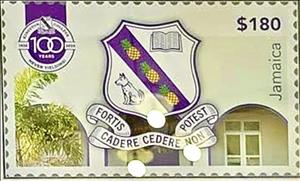Stamp: Kingston College, Centenary (Jamaica 2025)
Kingston College, Centenary (Jamaica 2025)
16 April (Jamaica ) within release Kingston College, Centenary (2025) goes into circulation Stamp Kingston College, Centenary face value 180 Jamaican dollar
| Stamp Kingston College, Centenary in catalogues | |
|---|---|
| Colnect codes: | Col: JM 2025.04.16-03 |
Stamp is square format.
Also in the issue Kingston College, Centenary (2025):
- Stamp - Kingston College, Centenary face value 100;
- Stamp - Kingston College, Centenary face value 120;
- Stamp - Kingston College, Centenary face value 180;
- Souvenir Sheet - Centenary of Kingston College face value 100;
- Stamp - Centenary of Kingston College face value 100;
|
Data entry completed
50%
|
|
|---|---|
| Stamp Kingston College, Centenary in digits | |
| Country: | Jamaica |
| Date: | 2025-04-16 |
| Print: | Offset lithography |
| Emission: | Commemorative |
| Format: | Stamp |
| Face Value: | 180 Jamaican dollar |
Stamp Kingston College, Centenary it reflects the thematic directions:
A building or edifice is a structure with a roof and walls standing more or less permanently in one place, such as a house or factory. Buildings come in a variety of sizes, shapes and functions, and have been adapted throughout history for a wide number of factors, from building materials available, to weather conditions, to land prices, ground conditions, specific uses and aesthetic reasons. Buildings serve several needs of society – primarily as shelter from weather, security, living space, privacy, to store belongings, and to comfortably live and work. A building as a shelter represents a physical division of the human habitat (a place of comfort and safety) and the outside (a place that at times may be harsh and harmful).
A coat of arms is an heraldic visual design on an escutcheon (i.e. shield), surcoat, or tabard. The coat of arms on an escutcheon forms the central element of the full heraldic achievement which in its whole consists of shield, supporters, crest, and motto. A coat of arms is traditionally unique to an individual person, family (except in the United Kingdom), state, organisation or corporation.
The domestic dog (Canis lupus familiaris or Canis familiaris) is a member of genus Canis (canines) that forms part of the wolf-like canids, and is the most widely abundant carnivore. The dog and the extant gray wolf are sister taxa, with modern wolves not closely related to the wolves that were first domesticated. The dog was the first domesticated species and has been selectively bred over millennia for various behaviors, sensory capabilities, and physical attributes. Their long association with humans has led dogs to be uniquely attuned to human behavior and they are able to thrive on a starch-rich diet that would be inadequate for other canid species. Dogs vary widely in shape, size and colours. Dogs perform many roles for people, such as hunting, herding, pulling loads, protection, assisting police and military, companionship and, more recently, aiding handicapped individuals. This influence on human society has given them the sobriquet "man's best friend".
A university (from Latin universitas 'a whole') is an institution of higher (or tertiary) education and research which awards academic degrees in several academic disciplines. University is derived from the Latin phrase universitas magistrorum et scholarium, which roughly means "community of teachers and scholars". Universities typically offer both undergraduate and postgraduate programs.




